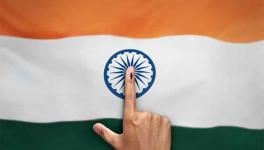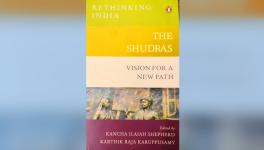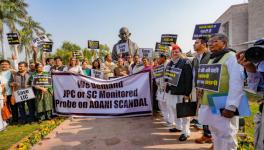Punjab Elections: Parties Want Dalit Votes, But Avoid Discussing Their Issues
Amid the lush green farms, the approach road to Jhaloor takes one to the big, spacious houses with a pucca road made of cement tiles. The sight changes after 50 metres as soon as one enters Ravidassia Mohalla. The pucca road vanishes, the overflowing drains emit stinking odour, and the houses are partially built. In the corner of the street, Balbir Singh retires on his cot in the verandah of his house. Punjab is in the midst of an election campaign where political parties have put their might in wooing the voters ahead of polling on February 20. However, the rabble-rouser campaign hardly interests Singh to discuss the manoeuvres of parties and the fate of the state post declaration of results.
Singh's family for long have been at the forefront of the struggle to get 33% of the land reserved for dalit communities for cultivation under the Village Common Land (Regulation) Act, 1961. The act mandates that the auction of reserved land for cultivation will be done annually transparently to be supervised under panchayat and revenue officials. However, the dominant Jutt community used their dalit workers as proxies to bid for reserved land and cultivate themselves.
The practise was challenged by Zameen Prapti Sangharsh Committee (ZPSC), an organisation dedicated to reclaiming land, for the first time in 2009. Soon, the movement spread to different parts of Punjab, including Sangrur, Mansa, Barnala and Bathinda.
However, the most vociferous campaign remained in the Sangrur district, where the organisation successfully campaigned for land rights and got these entitlements. The most prominent example remains Ballad Kalan, where dalits could get hold of 121-acre common land for cultivation. The struggle was often met with a social boycott where the villagers were threatened with fines if they employed protesting dalit families for any farm and cattle rearing work.
The most brutal resistance to the land rights movement was witnessed in Jhaloor on October 5, where the members of the Jutt community assaulted dalit families, broke vehicles, stripped naked women and paraded them in front of assaulting people for raising their voices.
To begin with, the auction of 16.5 acres of reserved common land was conducted on May 10, 2016, and the annual lease was awarded to Jugraj Singh, a proxy candidate who undertook bids for Gurdeep Babban, a jutt landlord. The villagers protested it to panchayat and block officials and wrote to the Additional Deputy Commissioner (Development) to revoke the award. In the second week of June, Singh planted paddy on the awarded land.
Enraged by inaction, the dalit villagers uprooted the crop. The protesting members held dharna on August 10 at the office of the block development officer. Amidst the ongoing protest, Singh again planted Paddy. Until September 29, 2016, there was no action on demands. Anguished farmers again went to farms and damaged the crop. The incident led to fresh confrontations between dalits and jutt landlords in which one person was injured on October 2.
Frightened over the incident, dalits held a protest at the sub-divisional magistrate's office in Lehra on October 5, seeking the protection and safety of family members. When the dalit villagers returned from the protest, they were attacked with rods and sharp weapons.
The women were at the forefront of the movement because they often faced physical and sexual harassment from Jutts when they went to farms to collect fodder for cattle. More than land entitlement, the dalit women saw it as a struggle to reclaim their dignity. During the attack, Singh lost her mother, Gurdev Kaur, when assaulters attacked her with an axe and cut away the lower portion of her leg.
Kaur succumbed to the injuries on November 12, 2016, in the Post Graduate Institute of Medical Education and Research, Chandigarh. The cremation of Kaur could be done only when the family members were given bail after 40 days. Even though normalcy has returned to the village, a disturbing silence prevails in the village.
Singh maintained that the attack caused immeasurable pain and trauma to the family. "My mother was killed. After six months, my father passed away due to the trauma of the attack. My elder son had qualified all tests for Punjab Police. He was about to join the service, but he was stopped owing to fabricated criminal cases against us."
Recalling his experience, Singh, now with Punjab Kisan Union, said the conflict between the dalits and jutts mounted after the advent of the green revolution. He said, "Dalits were usually employed as siri (bonded labour) who would be performing every task of household and farms. In return, a share of the crop was handed over to his family. Initially, it was the one-fifth share of the harvest; later, it dropped to one-tenth part. When machines came, and agriculture became less labour intensive post green revolution, the workers were hired as per the work requirement. The destitution increased their dependence on the land, but landlords were not even ready to give away the land which was their right as per the law."
When asked if he thought the struggle was inevitable and necessary, he said, "The struggle was very much essential, but the form could have been different. Our fight was with the government to ensure that the auction process remained transparent, but when ZPSC asked protesters to uproot the crops, it turned jutts against us. They failed to understand that the farmers had an emotional relationship with the crop."
Talking about the election campaign of political parties in Punjab, Singh said the dalits, 32% of the state's population, easily outnumber jutts (25%). Yet, political parties do not discuss their issues precisely because they are economically weak, socially oppressed and unorganised.
He said, "Leave the question of organising resistance. Some dalits cannot even talk to jutts because they carry a huge baggage of centuries-old oppression. However, Education has brought some level of awakening in them, and they are organising themselves in the form of students' organisations, agriculture workers' and youth organisations. The awakening has compelled the political parties to give us representation. Congress is saying its CM is a dalit. Akali Dal is saying it would appoint a dalit deputy CM. When Channi assumed the office, he did say that a survey to examine the ownership of land will be done, and land will be redistributed."
As per the land ceiling act, a person cannot own more than 17 acres of irrigated land.
He continued, "But the landlord lobby soon pressurised Channi to remain silent on the issue. We saw similar silence of Congress and AAP. I would not be talking about Akali Dal because it is very much a party of jutts. While former CM from Congress Rajinder Kaur Bhattal met the landlord families after the attack, she never visited us even when we were victims. AAP MP and now chief ministerial candidate Bhagwant Mann never spoke a word about the attack or social boycott calls in other villages in his constituency."
Singh also appeared dismissive about the promises of parties. Aam Aadmi Party has promised the electorate that every female person in the family will get Rs 1000 each month. In contrast, Congress has promised Rs 2000 per month to housewives. It has also called for waiving off the debt of farmers."Nobody is talking about unemployment. The state produces 4 lakh students per year out of Class 12th, but there are no jobs. They have promised one government job per family. How will they give jobs when public sector companies are being privatised?”
To understand the distress of dalits better, NewsClick travelled to Malout in Muktsar district, where agricultural labourers gathered for a meeting conducted under the banner of Punjab Khet Mazdoor Union to devise ways to organise them. Muktsar was in the news recently when a few villages, including Khunde Hulal, Grandad and Lokhewal, witnessed incidents of social boycott.
Raja Singh, an agricultural worker who came from Khunnan Khurd, told NewsClick that the resistance from landlords came whenever workers talked about increasing the wages. "We have been plucking the cotton. A few years ago, when we asked for an increased wage rate from Rs 3 per 5 kg to Rs 5 per 5 kg, the landlords called for a social boycott. They denied us passage to farms. We do not have toilets, and people naturally go to farms to attend nature's call. The landlords were so infuriated by our demand that they beat the young boy to clear excreta through hands only. In this situation, workers looked to cities for some work. They travelled even 50 kilometres to labour chowks to find work, but they return someday without work."
Lachhman Singh Sewewala, general secretary, Punjab Khet Mazdoor Union, looking over organisation activities at the meeting, told NewsClick on the sidelines of the meet that the oppression caused a societal crisis in Punjab which many did not expect in state.
The state witnessed different social and religious movements which directly attacked the caste system. From Guru Nanak, Ravidas to Ghadar Movement and Muzara struggle, the state saw an upsurge of anti-caste sentiment. But the changing agrarian relations upturned it fast. "People talk about Ravidassia community forming their Gurudwaras. Where did the need arise if Sikhism preached equality? They formed separate Gurudwaras because these institutions were used for making calls of social boycott through loudspeakers. They lost faith in these Gurudwaras."
Sewewala told NewsClick that the political parties are not discussing their issues because the jutt community control the political narrative. "In 2017, our organisation surveyed 1600 villages in Mansa, Faridkot, Bathinda and found that most families were under debt. Nineteen per cent of families slipped into debt only because they took loans to treat a family member. Unlike farmer families, we find the workers collectively commit suicide with family members. These are very apparent and often hit the headlines. The biggest plunderers are Micro Finance companies who charge as much as 60% per annum. Yet, the political parties do not want to discuss it."
Jatinder Singh, assistant professor at Punjabi University Patiala, told NewsClick that dalit issues not being discussed prominently are rooted in how national parties conduct themselves. "It is evident that Akali Dal is the first choice of jutt community. So, they never bothered about dalits. Now, Congress fielded Channi, and it has generated some hope, but national parties have hardly entertained the issues because they cannot handle the assertion given the national scenario. It needs regional parties to come up vocally on their issues. For example, Stalin in Tamil Nadu could only develop strong opposition to NEET. No national party entertained it seriously. For a brief time, Bahujan Samaj Party did try to tap the assertion, but it later found Uttar Pradesh a more suitable ground to operate. It would need another regional political player who can give this assertion a face."
Get the latest reports & analysis with people's perspective on Protests, movements & deep analytical videos, discussions of the current affairs in your Telegram app. Subscribe to NewsClick's Telegram channel & get Real-Time updates on stories, as they get published on our website.























